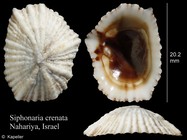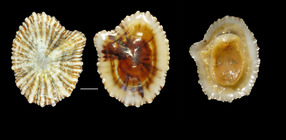WRiMS taxon details
Siphonaria crenata Blainville, 1827
181258 (urn:lsid:marinespecies.org:taxname:181258)
accepted
Species
marine, brackish, fresh, terrestrial
recent only
Blainville, H. M. D. de. (1827). Siphonaire, <i>Siphonaria</i> (Malacoz.), pp. 291-296, in: Dictionnaire des Sciences Naturelles (F. Cuvier, ed.), vol. 49. Levrault, Strasbourg & Paris, & Le Normant, Paris. , available online at http://biodiversitylibrary.org/page/25314546
page(s): p. 295; note: based on Savigny (1817), pl. 3 fig. 3-35 [details]
page(s): p. 295; note: based on Savigny (1817), pl. 3 fig. 3-35 [details]
MolluscaBase eds. (2025). MolluscaBase. Siphonaria crenata Blainville, 1827. Accessed through: Costello, M. J.; Ahyong, S.; Bieler, R.; Boudouresque, C.; Desiderato, A.; Downey, R.; Galil, B. S.; Gollasch, S.; Hutchings, P.; Kamburska, L.; Katsanevakis, S.; Kupriyanova, E.; Lejeusne, C.; Ma, K. C. K.; Marchini, A.; Occhipinti, A.; Pagad, S.; Panov, V. E.; Poore, G. C. B.; Rewicz, T.; Robinson, T. B.; Rius, M.; Sobczyk, R.; Stern, N.; Turon, X.; Valls Domedel, G.; Verleye, T.; Vieira, L. M.; Willan, R. C.; Yeo Chong Jinn, D.; Zhan, A. (2025) World Register of Introduced Marine Species (WRiMS) at: https://www.marinespecies.org/introduced/aphia.php?p=taxdetails&id=181258 on 2025-04-17
Costello, M. J.; Ahyong, S.; Bieler, R.; Boudouresque, C.; Desiderato, A.; Downey, R.; Galil, B. S.; Gollasch, S.; Hutchings, P.; Kamburska, L.; Katsanevakis, S.; Kupriyanova, E.; Lejeusne, C.; Ma, K. C. K.; Marchini, A.; Occhipinti, A.; Pagad, S.; Pino, L.; Poore, G. C. B.; Rewicz, T.; Rius, M.; Robinson, T. B.; Sobczyk, R.; Stępień, A.; Turon, X.; Valls Domedel, G.; Verleye, T.; Vieira, L. M.; Willan, R. C.; Zhan, A. (2025). World Register of Introduced Marine Species (WRiMS). Siphonaria crenata Blainville, 1827. Accessed at: https://marinespecies.org/introduced./aphia.php?p=taxdetails&id=181258 on 2025-04-17
original description
Blainville, H. M. D. de. (1827). Siphonaire, <i>Siphonaria</i> (Malacoz.), pp. 291-296, in: Dictionnaire des Sciences Naturelles (F. Cuvier, ed.), vol. 49. Levrault, Strasbourg & Paris, & Le Normant, Paris. , available online at http://biodiversitylibrary.org/page/25314546
page(s): p. 295; note: based on Savigny (1817), pl. 3 fig. 3-35 [details]
context source (Introduced species) Katsanevakis, S.; Bogucarskis, K.; Gatto, F.; Vandekerkhove, J.; Deriu, I.; Cardoso A.S. (2012). Building the European Alien Species Information Network (EASIN): a novel approach for the exploration of distributed alien species data. <em>BioInvasions Records.</em> 1: 235-245., available online at http://easin.jrc.ec.europa.eu [details] Available for editors
basis of record Zenetos, A.; Gofas, S.; Russo, G.; Templado, J. (2004). CIESM Atlas of exotic species in the Mediterranean. Vol. 3 Molluscs, 376 pp. <em>Monaco, CIESM Publishers.</em> , available online at https://web.archive.org/web/20210507152030/http://www.ciesm.org/atlas/appendix3.html
page(s): 208-209 [details]
additional source Zenetos, A., S. Gofas, M. Verlaque, M. Cinar, J. Garcia Raso, C. Bianchi, C. Morri, E. Azzurro, M. Bilecenoglu, C. Froglia, I. Siokou, D. Violanti, A. Sfriso, G. San Martin, A. Giangrande, T. Katagan, E. Ballesteros, A. Ramos-Espla, F. Mastrototaro, O. Ocana, A. Zingone, M,. Gambi & N. Streftaris. (2010). Alien species in the Mediterranean Sea by 2010. A contribution to the application of European Union's Marine Strategy Framework Directive (MSFD). Part I. Spatial distribution. <em>Mediterranean Marine Science.</em> 11(2): 381-493., available online at https://doi.org/10.12681/mms.87 [details]
additional source Delongueville C. & Scaillet R. (2010). Importante population de <i>Siphonaria crenata</i> Blainville, 1827 implantée à l'ouest du golfe d'Iskenderun (Turquie). <em>Novapex.</em> 11(1): 8-11., available online at http://www.vliz.be/imisdocs/publications/253903.pdf [details]
additional source Jenkins, B.; Köhler, F. (2024). Hidden in plain sight: Systematic review of Indo-West Pacific Siphonariidae uncovers extensive cryptic diversity based on comparative morphology and mitochondrial phylogenetics (Mollusca, Gastropoda). <em>Megataxa.</em> 13(1): 1-217., available online at https://doi.org/10.11646/megataxa.13.1.1
page(s): 40 [details] Available for editors
page(s): p. 295; note: based on Savigny (1817), pl. 3 fig. 3-35 [details]
context source (Introduced species) Katsanevakis, S.; Bogucarskis, K.; Gatto, F.; Vandekerkhove, J.; Deriu, I.; Cardoso A.S. (2012). Building the European Alien Species Information Network (EASIN): a novel approach for the exploration of distributed alien species data. <em>BioInvasions Records.</em> 1: 235-245., available online at http://easin.jrc.ec.europa.eu [details] Available for editors
basis of record Zenetos, A.; Gofas, S.; Russo, G.; Templado, J. (2004). CIESM Atlas of exotic species in the Mediterranean. Vol. 3 Molluscs, 376 pp. <em>Monaco, CIESM Publishers.</em> , available online at https://web.archive.org/web/20210507152030/http://www.ciesm.org/atlas/appendix3.html
page(s): 208-209 [details]
additional source Zenetos, A., S. Gofas, M. Verlaque, M. Cinar, J. Garcia Raso, C. Bianchi, C. Morri, E. Azzurro, M. Bilecenoglu, C. Froglia, I. Siokou, D. Violanti, A. Sfriso, G. San Martin, A. Giangrande, T. Katagan, E. Ballesteros, A. Ramos-Espla, F. Mastrototaro, O. Ocana, A. Zingone, M,. Gambi & N. Streftaris. (2010). Alien species in the Mediterranean Sea by 2010. A contribution to the application of European Union's Marine Strategy Framework Directive (MSFD). Part I. Spatial distribution. <em>Mediterranean Marine Science.</em> 11(2): 381-493., available online at https://doi.org/10.12681/mms.87 [details]
additional source Delongueville C. & Scaillet R. (2010). Importante population de <i>Siphonaria crenata</i> Blainville, 1827 implantée à l'ouest du golfe d'Iskenderun (Turquie). <em>Novapex.</em> 11(1): 8-11., available online at http://www.vliz.be/imisdocs/publications/253903.pdf [details]
additional source Jenkins, B.; Köhler, F. (2024). Hidden in plain sight: Systematic review of Indo-West Pacific Siphonariidae uncovers extensive cryptic diversity based on comparative morphology and mitochondrial phylogenetics (Mollusca, Gastropoda). <em>Megataxa.</em> 13(1): 1-217., available online at https://doi.org/10.11646/megataxa.13.1.1
page(s): 40 [details] Available for editors
 Present
Present  Inaccurate
Inaccurate  Introduced: alien
Introduced: alien  Containing type locality
Containing type locality
From regional or thematic species database
Introduced species vector dispersal in Israeli part of the Mediterranean Sea - Eastern Basin (Marine Region) : Canals: natural range expansion through man-made canals [details]




.jpg)